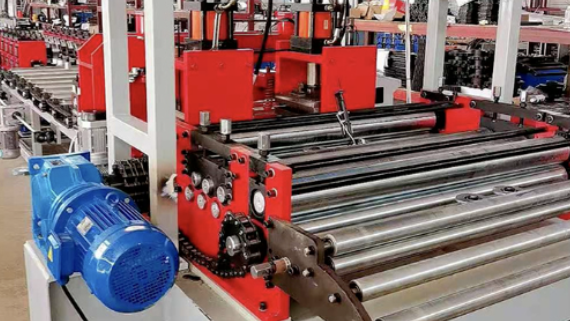Roll forming machines use various motor types to power their operation, each suited for different production needs and machine sizes.
Roll forming machines use various motor types to power their operation, each suited for different production needs and machine sizes. Here are the common motor types used in roll forming machines:
1. AC Induction Motors
- Usage: Widely used in roll forming machines due to their reliability and simplicity.
- Benefits: These motors are cost-effective, durable, and can handle high-power requirements, making them suitable for continuous, high-speed production lines.
- Drawbacks: Less efficient in terms of precise speed control without the use of an additional drive system.
2. DC Motors
- Usage: Commonly used when variable speed control is required in the roll forming process.
- Benefits: Offer better torque at low speeds, making them ideal for applications requiring precise adjustments in forming speed.
- Drawbacks: DC motors tend to require more maintenance compared to AC motors due to the use of brushes and commutators.
3. Servo Motors
- Usage: Employed in roll forming machines that need high-precision control, especially for intricate profiles or automated systems.
- Benefits: Excellent for accurate positioning, speed control, and complex motion sequences. They are typically used in machines with automated, computer-controlled operations.
- Drawbacks: Higher cost compared to traditional motors but provide superior control and efficiency.
4. Stepper Motors
- Usage: Used in roll forming machines where precise positioning and incremental control are required.
- Benefits: Provide exact movements without needing feedback systems, making them useful in machines that need fine control over forming steps.
- Drawbacks: Limited torque and speed range, which makes them unsuitable for heavy-duty applications.
5. Brushless DC Motors (BLDC)
- Usage: Increasingly popular in advanced roll forming machines due to their efficiency and reliability.
- Benefits: Provide high efficiency, low maintenance, and are well-suited for machines that require long operational hours with minimal downtime.
- Drawbacks: Higher initial cost, but the benefits of reduced maintenance and energy savings often offset this.
6. Hydraulic Motors
- Usage: Found in specific roll forming machines that require high force for forming heavy materials.
- Benefits: Offer powerful torque, ideal for heavy-duty forming tasks.
- Drawbacks: Typically more complex systems that require hydraulic fluid management, making them more maintenance-intensive.
Each motor type has its advantages and is chosen based on the specific needs of the roll forming machine, including speed, precision, and the type of material being formed.




